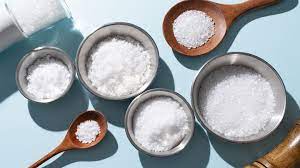- Empty cart.
- Continue Shopping
The Risks of Consuming Excess Salt

Salt, or sodium chloride, is a common and essential component of our diet. It adds flavor to our meals and plays a crucial role in various bodily functions. However, like many things in life, moderation is key. Consuming excessive amounts of salt can have detrimental effects on our health.
Understanding the Role of Salt
Salt is more than just a seasoning; it serves several vital functions in our bodies:
- Electrolyte Balance: Sodium, a component of salt, helps regulate the balance of fluids in and around our cells.
- Nerve Function: Sodium is essential for the transmission of nerve impulses, allowing our muscles to contract and our nerves to communicate.
- Blood Pressure: Sodium influences blood pressure, and maintaining the right balance is crucial for cardiovascular health.
While our bodies need a certain amount of sodium to function properly, consuming too much can lead to various health problems.
Health Risks Associated with Excess Salt
1. Hypertension (High Blood Pressure):
One of the most well-known risks of excessive salt consumption is high blood pressure. When you consume too much salt, your body retains excess water to dilute the sodium. This extra fluid increases blood volume, leading to increased pressure on the blood vessel walls. Over time, this can strain the cardiovascular system and contribute to hypertension.
2. Cardiovascular Disease:
High blood pressure, often resulting from excessive salt intake, is a significant risk factor for heart disease, including heart attacks and strokes. The increased pressure on the arteries can lead to their narrowing and hardening, making it more challenging for blood to flow freely.
3. Kidney Damage:
The kidneys play a critical role in regulating sodium levels in the body. Excess salt can put a strain on the kidneys as they work to filter and excrete the surplus sodium. Over time, this can lead to kidney damage and an increased risk of kidney disease.
4. Osteoporosis:
A high-sodium diet can lead to increased calcium excretion through urine. This calcium loss can weaken bones and contribute to the development of osteoporosis, a condition characterized by fragile and brittle bones.
5. Stomach Cancer:
Some studies suggest a link between high salt intake and an increased risk of stomach cancer. Consuming salt-preserved foods, like pickles and processed meats, is particularly associated with this risk.
6. Edema:
Excessive salt intake can lead to the accumulation of fluid in the body’s tissues, causing swelling or edema. This condition can be uncomfortable and may affect mobility and overall well-being.
7. Dehydration:
Paradoxically, excessive salt intake can lead to dehydration. As your body attempts to flush out the excess sodium, it requires more water. If you don’t drink enough fluids to compensate, you can become dehydrated.
Tips for Reducing Salt Intake
Reducing salt intake is essential for maintaining good health and preventing the associated risks. Here are some practical tips to help you consume less salt:
1. Read Food Labels:
Check the sodium content on food labels when shopping for groceries. Opt for lower-sodium options, and be cautious of products with high sodium levels.
2. Cook at Home:
When you cook at home, you have more control over the ingredients you use. Choose fresh, whole foods and minimize the use of salt in your recipes. Experiment with herbs and spices to enhance flavor without adding sodium.
3. Limit Processed Foods:
Processed and pre-packaged foods, including canned soups, snacks, and frozen meals, are often high in sodium. Try to reduce your consumption of these items.
4. Rinse Canned Foods:
If you use canned vegetables or beans, rinse them thoroughly under running water to remove some of the salt.
5. Be Cautious with Condiments:
Sauces, dressings, and condiments like soy sauce and ketchup can be surprisingly high in sodium. Use them sparingly or seek out low-sodium alternatives.
6. Eat More Fresh Fruits and Vegetables:
Fresh fruits and vegetables are naturally low in sodium and high in essential nutrients. Incorporate them into your meals to boost overall health.
7. Limit Dining Out:
Restaurant meals often contain more salt than homemade dishes. If you dine out frequently, choose restaurants that offer lower-sodium options or ask for dishes to be prepared with less salt.
8. Drink Plenty of Water:
Stay well-hydrated by drinking enough water throughout the day. This can help flush excess sodium from your system.
In Conclusion, While salt is an essential element in our diet, excessive consumption can lead to various health risks, including hypertension, cardiovascular disease, kidney damage, and more. To maintain good health and reduce these risks, it’s crucial to be mindful of your salt intake. By reading food labels, cooking at home, choosing low-sodium options, and making other dietary adjustments, you can enjoy a flavorful and healthy diet while keeping your salt intake in check. Prioritizing a balanced and low-sodium diet is an essential step towards better overall well-being.








